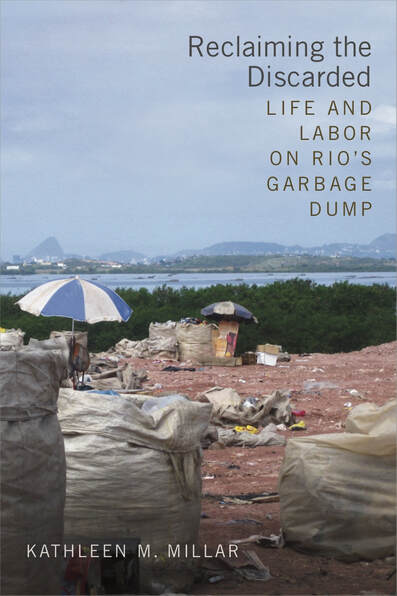|
Duke University Press, 2018
In Reclaiming the Discarded Kathleen M. Millar offers an evocative ethnography of Jardim Gramacho, a sprawling garbage dump on the outskirts of Rio de Janeiro, where roughly two thousand self-employed workers known as catadores collect recyclable materials. While the figure of the scavenger sifting through garbage seems iconic of wageless life today, Millar shows how the work of reclaiming recyclables is more than a survival strategy or an informal labor practice. Rather, the stories of catadores show how this work is inseparable from conceptions of the good life and from human struggles to realize these visions within precarious conditions of urban poverty. By approaching the work of catadores as highly generative, Millar calls into question the category of informality, common conceptions of garbage, and the continued normativity of wage labor. In so doing, she illuminates how waste lies at the heart of relations of inequality and projects of social transformation.
"This beautifully written ethnography captures the daily living and precarious lives of impoverished workers and how they manage to be creative in spite of the harsh economic context. Daily problems permeate these lives, but there is also a celebration of life. This wonderful book is hard to put down, and its subject is new and freshly presented."--Donna M. Goldstein, author of Laughter Out of Place: Race, Class, Violence, and Sexuality in a Rio Shantytown. "Through a narrative built around a constellation of persons and objects, Jardim Gramacho comes alive in this gripping ethnography of garbage-reclaiming work and life in Rio's urban periphery. Kathleen M. Millar resists facile explanations of life in the dump, opting instead to closely listen to her interlocutors' stories, find value in literal interpretations of their words, and take ambivalences and contradictions not as calls for authoritative intervention but as invitations to inhabit the subtleties and complexities of their formidable social world. Reclaiming the Discarded is beautifully written and its argument disrupts truisms that sustain whole fields of inquiry." -- Daniella Gandolfo, author of The City at Its Limits: Taboo, Transgression, and Urban Renewal in Lima. |
Awards
Co-winner of the 2020 Society for Economic Anthropology Book Prize
Winner of the 2019 Society for Latin American and Caribbean Anthropology Book Prize
Honorable Mention, 2019 American Ethnological Society's Sharon Stephens Book Prize
Honorable Mention, 2019 Latin American Studies Association Brazil Section, Best Book in the Social Sciences (Sérgio Buarque de Holanda Prize)
Finalist, 2019 Society for the Anthropology of Work Book Prize
|
